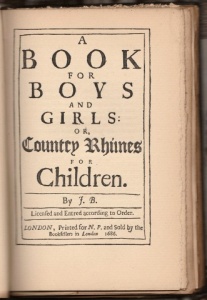John Bunyan’s Poetry for Children
Listen to the Recess! Clip
| Author | Rita Smith with reading by Hank Conner |
| Air Date | 4/12/2000 |

John Bunyan Transcript
For Young People’s Poetry Week, Rita Smith brings us a poetic rediscovery.
This week we are celebrating National Youth Poetry Week. Poetry has been used as a means of teaching and entertaining children for centuries. The first English writers to use poetry methodically as a means of instructing children in religion were the 17th century puritans. A Book for Boys and Girls, written by John Bunyan, and published in London in 1686, may justly be called the first notable English book of verse for children. Bunyan, better known as the author of Pilgrim’s Progress, was a devout Nonconformist who became a travelling preacher. He was imprisoned for 12 years for preaching without a license and it was in prison that he did most of his writing.
A Book for Boys and Girls is addressed to children “of all Sorts and Degrees, / From those of Age, to Children on the Knees.”(1) In the poems, Bunyan draws spiritual lessons from such diverse subjects as clouds, birds, a spinning top, chalk, bad breath, and the Sacraments. At the beginning, Bunyan states his method intention. By first focusing on familiar toys and animals and getting the children’s attention, he would then entice them “To mount their Thoughts from what are childish Toys, / To Heav’n, for that’s prepar’d for Girls and Boys.”(2)
The book was popular, staying in print through the 19th century, although with some of the original poems edited out. Bunyan is thought to have drawn his inspiration from Aesop and Biblical parables and although his verse now seems strained, it was fresh and original for its time.(3) Here are two poems taken from the 1686 edition of A Book for Boys and Girls.
No. XXXVI
Upon the Frog
The Frog by Nature is both damp and cold,
Her Mouth is Large, her Belly much will hold:
She sits somewhat ascending, loves to be
Croaking in Gardens, tho unpleasantly.
The Hyppocrite is like unto this Frog;
As like as is the Puppy to the Dog.
He is of nature cold, his Mouth is wide,
To prate, and true Goodness to deride.
He mounts his Head, as if he was above
The World, when yet Ît is that which has his Love.
And though he seeks in Churches for to croak,
He neither loveth Jesus, nor his Yolk.(4)
No. LII
On the Kackling of a Hen
The Hen so soon as she an Egg doth lay,
(Spreads the Fame of her doing, what she may.)
About the Yard she kackling now doth go,
To tell what Îtwas she at her Nest did do.
Just thus it is with some Professing men,
If they do ought that good is, like our Hen
They can’t but kackle on’t, where’ere they go,
What their right hand doth, their left hand must know.(5)
(1)Bunyan, John. A Book for Boys and Girls, or, Country Rhimes for Children. p.1.
(2)Ibid. p. 2.
(3)Carpenter, Humphrey. The Oxford companion to Children’s Literature, p. 70-71, 88.
(4)Bunyan, p. 46-47.
(5)Ibid. p. 60-61.
Sources:
Bunyan, John. A Book for Boys and Girls, or Country Rhimes for Children. London: Printed for N.P. 1686.
Carpenter, Humphrey and Mari Prichard. The Oxford Companion to Children’s Literature. Oxford and New York: Oxford University Press. 1984.